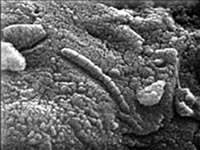E.T. and God:

Could earthly religions survive the discovery of life elsewhere in the universe?
10.17.2006 (Paul Davies - 2003)
Summary: The discovery of just a single bacterium somewhere beyond Earth would force us to revise our understanding of who we are and where we fit into the cosmic scheme of things, throwing us into a deep spiritual identity crisis that would be every bit as dramatic as the one Copernicus brought about in the early 1500s, when he asserted that Earth was not at the center of the universe.
~~~~~~~~~~~~~~~~~~~~~~~~~~~~~~~
The recent discovery of abundant water on Mars, albeit in the form of permafrost, has raised hopes for finding traces of life there. The Red Planet has long been a favorite location for those speculating about extraterrestrial life, especially since the 1890s, when H. G. Wells wrote The War of the Worlds and the American astronomer Percival Lowell claimed that he could see artificial canals etched into the planet's parched surface. Today, of course, scientists expect to find no more than simple bacteria dwelling deep underground, if even that. Still, the discovery of just a single bacterium somewhere beyond Earth would force us to revise our understanding of who we are and where we fit into the cosmic scheme of things, throwing us into a deep spiritual identity crisis that would be every bit as dramatic as the one Copernicus brought about in the early 1500s, when he asserted that Earth was not at the center of the universe.
Whether or not we are alone is one of the great existential questions that confront us today. Probably because of the high emotional stakes, the search for life beyond Earth is deeply fascinating to the public. Opinion polls and Web-site hits indicate strong support for and interest in space missions that are linked even obliquely to this search. Perceiving the public's interest, NASA has reconfigured its research strategy and founded the NASA Astrobiology Institute, dedicated to the study of life in the cosmos. At the top of the agenda, naturally, is the race to find life elsewhere in the solar system.
Researchers have long focused on Mars in their search for extraterrestrial life because of its relative proximity. But twenty-five years ago, as a result of the 1976 Viking mission, many of them became discouraged. A pair of spacecraft had passed through the planet's extremely thin atmosphere, touched down on the surface, and found it to be a freeze-dried desert drenched with deadly ultraviolet rays. The spacecraft, equipped with robotic arms, scooped up Martian dirt so that it could be examined for signs of biological activity. The results of the analysis were inconclusive but generally negative, and hopes faded for finding even simple microbes on the surface of Mars.
The outlook today is more optimistic. The renewed interest is due in part to the discovery of organisms living in some remarkably hostile environments on Earth (which opens up the possibility of life on Mars in places the Viking probes didn't examine), and in part to better information about the planet's ancient history. Scientists now believe that Mars once had a much thicker atmosphere, higher temperatures, rivers, floods, and extensive volcanic activity—all conditions considered favorable to the emergence of life.
 The prospects for finding living organisms on Mars remain slim, of course, but even traces of past life would represent a discovery of unprecedented scientific value. Before any sweeping philosophical or theological conclusions could be drawn, however, it would be necessary to determine whether this life was the product of a second genesis—that is, whether its origin was independent of life on Earth. Earth and Mars are known to trade material in the form of rocks blasted from the planets' surfaces by the violent impacts of asteroids and comets. Microbes could have hitched a ride on this detritus, raising the possibility that life started on Earth and was transferred to Mars, or vice versa. If traces of past life were discovered on Mars but found to be identical to some form of terrestrial life, transportation by ejected rocks would be the most plausible explanation, and we would still lack evidence that life had started from scratch in two separate locations. The prospects for finding living organisms on Mars remain slim, of course, but even traces of past life would represent a discovery of unprecedented scientific value. Before any sweeping philosophical or theological conclusions could be drawn, however, it would be necessary to determine whether this life was the product of a second genesis—that is, whether its origin was independent of life on Earth. Earth and Mars are known to trade material in the form of rocks blasted from the planets' surfaces by the violent impacts of asteroids and comets. Microbes could have hitched a ride on this detritus, raising the possibility that life started on Earth and was transferred to Mars, or vice versa. If traces of past life were discovered on Mars but found to be identical to some form of terrestrial life, transportation by ejected rocks would be the most plausible explanation, and we would still lack evidence that life had started from scratch in two separate locations.
The significance of this point is crucial. In his theory of evolution Charles Darwin provided a persuasive account of how life evolved over billions of years, but he pointedly omitted any explanation of how life got started in the first place. "One might as well think of origin of matter," he wrote in a letter to a friend. A century and a half later, scientists still have little understanding of how the first living thing came to be.
Some scientists believe that life on Earth is a freak accident of chemistry, and as such must be unique. Because even the simplest known microbe is breathtakingly complex, they argue, the chances that one formed by blind molecular shuffling are infinitesimal; the probability that the process would occur twice, in separate locations, is virtually negligible. The French biochemist and Nobel laureate Jacques Monod was a firm believer in this view. "Man at last knows he is alone in the unfeeling immensity of the universe, out of which he has emerged only by chance," he wrote in 1971. He used this bleak assessment as a springboard to argue for atheism and the absurdity and pointlessness of existence. As Monod saw it, we are merely chemical extras in a majestic but impersonal cosmic drama—an irrelevant, unintended sideshow.
But suppose that's not what happened. Many scientists believe that life is not a freakish phenomenon (the odds of life's starting by chance, the British cosmologist Fred Hoyle once suggested, are comparable to the odds of a whirlwind's blowing through a junkyard and assembling a functioning Boeing 747) but instead is written into the laws of nature. "The universe must in some sense have known we were coming," the physicist Freeman Dyson famously observed. No one can say precisely in what sense the universe might be pregnant with life, or how the general expectancy Dyson spoke of might translate into specific physical processes at the molecular level. Perhaps matter and energy always get fast-tracked along the road to life by what's often called "self-organization." Or perhaps the power of Darwinian evolution is somehow harnessed at a pre-biotic molecular stage. Or maybe some efficient and as yet unidentified physical process (quantum mechanics?) sets the gears in motion, with organic life as we know it taking over the essential machinery at a later stage. Under any of these scenarios life becomes a fundamental rather than an incidental product of nature. In 1994, reflecting on this same point, another Nobel laureate, the Belgian biochemist Christian de Duve, wrote, "I view this universe not as a 'cosmic joke,' but as a meaningful entity—made in such a way as to generate life and mind, bound to give birth to thinking beings able to discern truth, apprehend beauty, feel love, yearn after goodness, define evil, experience mystery."
Absent from these accounts is any mention of miracles. Ascribing the origin of life to a divine miracle not only is anathema to scientists but also is theologically suspect. The term "God of the gaps" was coined to deride the notion that God can be invoked as an explanation whenever scientists have gaps in their understanding. The trouble with invoking God in this way is that as science advances, the gaps close, and God gets progressively squeezed out of the story of nature. Theologians long ago accepted that they would forever be fighting a rearguard battle if they tried to challenge science on its own ground. Using the formation of life to prove the existence of God is a tactic that risks instant demolition should someone succeed in making life in a test tube. And the idea that God acts in fits and starts, moving atoms around on odd occasions in competition with natural forces, is a decidedly uninspiring image of the Grand Architect.
The theological battle line in relation to the formation of life is not, therefore, between the natural and the miraculous but between sheer chance and lawlike certitude. Atheists tend to take the first side, and theists line up behind the second; but these divisions are general and by no means absolute. It's perfectly possible to be an atheist and believe that life is built ingeniously into the nature of the universe. It's also possible to be a theist and suppose that God engineered just one planet with life, with or without the help of miracles.
Though the discovery of microbes on Mars or elsewhere would ignite a passionate theological debate, the truly difficult issues surround the prospect of advanced alien beings in possession of intelligence and technology. Most scientists don't think that such beings exist, but for forty years a dedicated band of astronomers has been sweeping the skies with radio telescopes in hopes of finding a message from a civilization elsewhere in the galaxy. Their project is known as SETI (Search for Extraterrestrial Intelligence).
Part 2 -->
|

